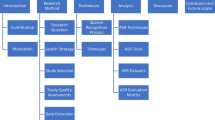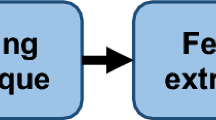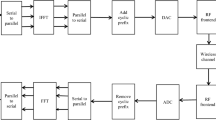Abstract
The persistent improvement of the hybrid adaptive algorithms and the swift growth of signal processing chip enhanced the performance of signal processing technique exalted mobile transceiver systems. The proposed artificial neural network hybrid back propagation adaptive algorithm for mobile applications used for noise cancellation. Adaptive noise cancellation using ANN has been implemented on audio speech signal is a new and intelligent method for real-time noise cancellation based on neural networks. Networks of this kind are quite often used for error cancellation, speech signal processing and control systems. The proposed hybrid algorithm consists all the significant features of gradient adaptive lattice and least mean square algorithms. The performance analysis of the method is performed by considering convergence complexity and bit error rate parameters along with performance analyzed with varying some parameters such as number of filter coefficients, step size, number of samples along with input noise level. The outcomes suggest the errors are reduced significantly for the number of epochs are increased. Also, incorporation of less hidden layers resulted in negligible computational delay along with effective utilization of memory. All the results have been obtained using hardware implementation and computer simulations built on MATLAB platform.










Similar content being viewed by others
References
A. Quadri, M.R. Manesh, N. Kaabouch, Denoising signals in cognitive radio systems: an evolutionary algorithm based adaptive filter, in IEEE Annual Ubiquitous Computing, Electronics & Mobile Communication Conference (2016), pp. 1–6
M.R. Manesh, A. Quadri, S. Subramanian, N. Kaabouch, An optimized SNR estimation technique using particle swarm optimization algorithm, in IEEE consumer communications and networking conference (2017), pp. 1–7
A. Quadri, M.R. Manesh, N. Kaabouch, Performance comparison of evolutionary algorithms for noise cancellation in cognitive radio systems, in IEEE Consumer Communications and Networking Conference (2017), pp.1–6.
R. Tandra, A. Sahai, Fundamental limits on detection in low SNR under noise uncertainty, in Proceedings of the International Conference on Wireless Networks, Communications and Mobile Computing, vol. 1, (Maui, Hawaii, 2005), pp. 464–469
Y. Zeng, Y. Liang, A. Hoang, R. Zhang, A review on spectrum sensing for cognitive radio: challenges and solutions. EURASIP J. Adv. Signal Process. 2010, 1–16 (2010)
M.Z. Alom, H.J. Lee, Performance analysis of beamforming algorithm for noise cancellation with respect to the arrival angles of interference signal, in International Conference on Cyber-Enabled Distributed Computing and Knowledge Discovery, Huangshan (2010), pp. 396–399
K.F. Akingbade, I.A. Alimi, Separation of digital audio signals using least mean square (LMS) adaptive algorithm. Int. J. Electr. Comput. Eng. 4, 4 (2014)
J.R. Mohammed, Low complexity adaptive noise canceller for mobile phones based remote health monitoring. Int. J. Electr. Comput. Eng. 4, 3 (2014)
J. Yoon, H. Zhang, S. Banerjee, S. Rangarajan, Video multicast with joint resource allocation and adaptive modulation and coding in 4G networks. IEEE ACM Trans. Netw. 22(5), 1531–1544 (2014)
S.K. Roy, C.F. Rodrigues, Echo canceller using error back propagation algorithm, in 2014 International Conference on Soft Computing and Machine Intelligence, New Delhi (2014), pp. 98–101
M.A. Ruder, A.M. Lehmann, R. Schober, W.H. Gerstacker, Single antenna interference cancellation for GSM/VAMOS/EDGE Using $L_{p}$-norm detection and decoding. IEEE Trans. Wirel. Commun. 14(5), 2413–2425 (2015)
S.M. Vijaya et al., An efficient design approach of ROI based DWT using vedic and walace tree multiplier on FPGA platform. Int. J. Electr. Comput. Eng. (IJECE) 9(4), 2433–2442 (2019)
J.W. Kelly, D.P. Siewiorek, A. Smailagic, W. Wang, An adaptive filter for the removal of drifting sinusoidal noise without a reference. IEEE J. Biomed. Health Inform. 20(1), 213–221 (2016)
R.R. Chilipi, N. Al Sayari, A.R. Beig, K. Al Hosani, A multitasking control algorithm for grid-connected inverters in distributed generation applications using adaptive noise cancellation filters. IEEE Trans. Energy Convers. 31(2), 714–727 (2016)
J. Arenas-Garcia, L.A. Azpicueta-Ruiz, M.T.M. Silva, V.H. Nascimento, A.H. Sayed, Combinations of adaptive filters: performance and convergence properties. IEEE Signal Process. Mag. 33(1), 120–140 (2016)
S. Dixit, D. Nagaria, LMS adaptive filters for noise cancellation; a review. Int. J. Electr. Comput. Eng. 7(5), 2520–2532 (2017)
Z. Zheng, Z. Liu, H. Zhao, Y. Yu, L. Lu, Robust set-membership normalized subband adaptive filtering algorithms and their application to acoustic echo cancellation. IEEE Trans. Circuits Syst. I Regul. Pap. 64(8), 2098–2111 (2017)
S. Zhang, W.X. Zheng, J. Zhang, H. Han, A family of robust M-shaped error weighted least mean square algorithms: performance analysis and echo cancellation application. IEEE Access 5, 14716–14727 (2017)
A.M. Prasanna Kumar, S.M. Vijaya, Noise cancellation employing adaptive digital filters for mobile applications. Indones. J. Electr. Eng. Inf. (IJEEI) 8(1), 112–122 (2020)
M.A. Ahmed, C.C. Tsimenidis, Tight upper bound performance of full-duplex MIMO-BICM-IDD systems in the presence of residual self-interference. IEEE Trans. Wirel. Commun. 17(1), 520–532 (2018)
E.C. Mengüç, Novel quaternion-valued least-mean kurtosis adaptive filtering algorithm based on the GHR calculus. IET Signal Proc. 12(4), 487–495 (2018)
A.M.P. Kumar, K. Ramesha. Adaptive filter algorithms based noise cancellation using neural network in mobile applications, in International Conference on Intelligent Computing and Applications, (Springer, Singapore, 2018)
L. Ferdouse, N. Akhter, T.H. Nipa, F.T. Jaigirdar, Simulation and performance analysis of adaptive filtering algorithms in noise cancellation. arXiv:1104.1962 (2011)
Author information
Authors and Affiliations
Corresponding author
Additional information
Publisher's Note
Springer Nature remains neutral with regard to jurisdictional claims in published maps and institutional affiliations.
Rights and permissions
About this article
Cite this article
Kumar, A.M.P., Vijaya, S.M. ANNHBPAA Based Noise Cancellation Employing Adaptive Digital Filters for Mobile Applications. J. Inst. Eng. India Ser. B 102, 645–653 (2021). https://doi.org/10.1007/s40031-021-00593-7
Received:
Accepted:
Published:
Issue Date:
DOI: https://doi.org/10.1007/s40031-021-00593-7




